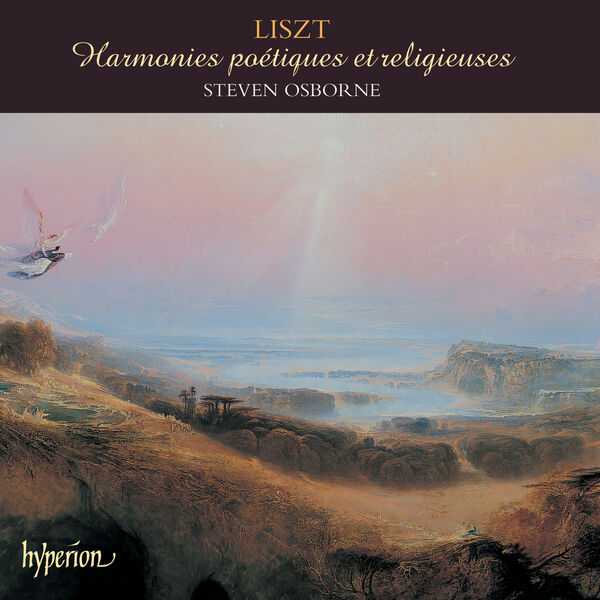
Composer: Ferencz Liszt
Performer: Steven Osborne
Number of Discs: 2
Format: FLAC (tracks)
Label: Hyperion
Catalogue: CDA67445
Release: 2004
Size: 203 MB
Recovery: +3%
Scan: yes
Harmonies poétiques et religieuses (10), S. 173
CD 01
01. I. Invocation
02. II. Ave Maria
03. III. Bénédiction de Dieu dans la solitude
04. IV. Pensée des morts
05. V. Pater noster
CD 02
01. VI. Hymne de l’Enfant à son réveil
02. VII. Funérailles
03. VIII. Miserere d’après Palestrina
04. IX. [Andante lagrimoso]
05. X. Cantique d’amour
One of Liszts most personal and confessional piano cycles, the Harmonies poetiques et religieuses (composed between 1846 and 1851) contains two of his best-loved masterpieces the serenely contemplative Benediction de Dieu dans la solitude and the heroic elegy Funerailles. This outstanding recording makes a much-needed case for the collection as a whole, setting these well-known works in their wider spiritual context. Important works such as Pensee des morts (an extraordinarily dark meditation on the oft-visited subject of death) and Cantique damour (one of Liszts most beautifully expressive reveries) are revealed, as are rarely heard transcriptions of Liszts own sacred choral works. Steven Osborne captures the musics spiritual essence to perfection, further demonstrating his affinity with music of mystical contemplation, a quality so widely acclaimed in his superb recording of Messiaens Vingt Regards.
Anticipating the developments of his maturity, Franz Liszt’s Harmonies poétiques et religieuses is an important transitional piece, if not especially coherent or profound. Liszt’s sentimentality and chronic showmanship prevent this set of pious reveries from achieving the deepest spiritual dimensions. But there are many reflective moments in this work that indicate a growing seriousness and even presage the dark emotions and austerity of his final period. While the Invocation, Bénédiction de Dieu dans la solitude, and the Cantique d’amour are predictably ecstatic in their climaxes, each contains sustained passages of calm introspection. Liszt’s transcriptions of his choral works — Ave Maria, Pater noster, and the Hymne de l’enfant à son réveil — along with the Miserere, d’après Palestrina are comparatively unembellished and striking in their purity. Liszt’s religiosity dominates Harmonies, but he offsets it with three poetic musings on sorrow and death. The Pensée des morts, Funérailles, and the Andante lagrimoso are surprisingly stark and subdued, and look forward to the muted late piano works. In Steven Osborne’s thoughtful interpretations, Liszt’s excesses are somewhat minimized and his subtleties are solidly reinforced. Osborne’s low-key approach may seem antithetical to Liszt — perhaps too Chopin-esque — but the results are at least tasteful and often more intriguing than a flashier reading would permit.